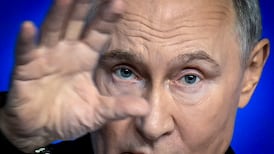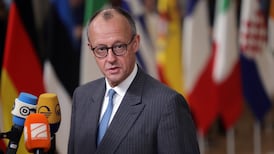Russia's lower house of parliament has overwhelmingly approved a treaty to annex Crimea from Ukraine, leaving just one legal obstacle for the Black Sea peninsula to cross before it is formally absorbed by Moscow.
Only one deputy in the State Duma voted against the treaty, and the Federation Council upper house is expected to complete ratification on Friday, signed by president Vladimir Putin and Crimean leaders on Tuesday.
The State Duma chamber stood for the national anthem after the vote, approved by 443 deputies in an almost full chamber .
"From now on, and forever, the Republic of Crimea and Sevastopol will be in the Russian Federation, " pro-Kremlin lawmaker Leonid Slutsky said in an address before the vote.
The Crimean port city of Sevastopol is home to the Russian Black Sea Fleet. Russian forces are now in control of the peninsula, which has an ethnic Russian majority and voted for union with Russia on Sunday.
Approval of the treaty in the rubber-stamp parliament had never been in doubt once it was signed by Mr Putin.
"I am certain the passage of these documents will be a turning point in the fate of the multi-ethnic peoples of Crimea and Russia, who are linked by the close ties of historical solidarity," foreign minister Sergei Lavrov told the Duma after presenting the treaty to the chamber.
Describing annexation of Crimea as needed to protect ethnic Russians there, he said: “To this day, lawlessness continues, and there are daily actions by nationalists, anti-Semites and other extremists on whom the new (Ukrainian) authorities depend.”
He added: “The unification of these peoples in one state will promote the well-being and prosperity and serve the interests of Russia.”
Earlier, Mr Lavrov blamed the crisis on the West, without specifically mentioning the United States. He said Western nations were trying to "preserve their global leadership and display their exceptionalism rather than striving to be guided by international law".
“The events in Ukraine are a reflection of these approaches,” Mr Lavrov said, adding that Moscow would continue to use “political, diplomatic and legal methods” to protect Russians abroad.
“We will insist that countries in which our compatriots have found themselves fully respect their rights and freedoms,” he said. Russia accuses the new pro-Western authorities in Kiev of endangering Russian-speakers in eastern Ukraine.
The annexation treaty goes into force once ratified and stipulates that Crimea will be fully integrated into Russia after a transition period ending on January 1st.
Russia has begun issuing Russian passports to Crimeans, Interfax quoted Russia's immigration agency chief, Konstantin Romodanovsky, as saying.
Crimean voters overwhelmingly backed joining Russia in a referendum on Sunday but the West says the vote was illegal.
The United States and Europe have imposed sanctions on officials and lawmakers accused of involvement in the annexation, partially suspended military and trade ties, and threatened more punitive measures.
Finance minister Anton Siluanov has said Russia will cover Crimea's estimated 55 billion rouble (€1.1 billion) budget deficit with funds from the federal budget. Energy minister Alexander Novak said Russia would also ensure Crimea has a constant power supply by providing back-up sources and controlling fuel reserves.
Meanwhile Russian border guards have stepped up checks on goods entering from Ukraine, officials from the customs services and an agricultural inspection service said today.
"Russian customs have increased customs checks, acting on information about possible attempts to bring contraband in from Ukraine, including weapons," said Dmitry Kotikov, a customs spokesman.
Russian authorities have also taken over a Ukrainian-owned confectionery factory located in the Russian city of Lipetsk and halted production, the Ukrainian government said today.
Navy Commander
Earlier today the commander of Ukraine's navy was freed after being held by Russian forces and local Crimean militia at the navy's headquarters. Rear Admiral Sergei Haiduk and an unspecified number of civilians were held for hours after the navy's base in Sevastopol was stormed by pro-Russian forces , a day after a Ukrainian soldier was shot dead
Acting Ukrainian president Oleksander Turchinov warned Russia it would take action if pressure on its forces in Crimea continued.















